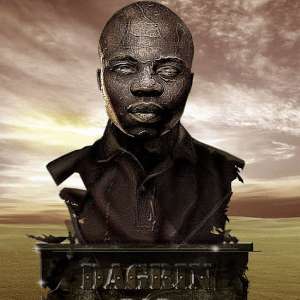(adsbygoogle = window.adsbygoogle || []).push({});

The impact late rapper, Dagrin, had on modern Nigerian music cannot be appraised without understanding his style of traditional music and what it stood for. Dagrin was renowned for inventing exotic indigenous Yoruba rap which crossed beyond the traditional hip-hop to mainstream music, which many people identify with today. In this piece, ANTHONY ADA ABRAHAM writes on the influence traditional hip hop has on the music industry
It was a big risk on his part to have wanted to build on the pioneering experiment of Lord of Ajasa, who ascended into the music scene with Yoruba rap in the early 2000s. Lord of Ajasa never really attained super stardom, likewise the likes of Zakki, 2Shotz and Big Lo. 9ice did it in Yoruba with his proverbial songs before the late Dagrin came on the scene but never in the hip-hop genre.
After Lord of Ajasa went into recluse, the late Dagrin came on board around 2008, with tracks such as ‘Idi Nla’ and ‘Efimile’ with YQ. The lyrics of Dagrin’s ‘Pon Pon Pon’, ‘Kondo’ and later ‘Sisi Eko’ and others dealt surgically with a ‘hip’ culture which was gradually getting popular then. Only Eedris Abdulkareem and Ruggedman, among the earliest indigenous rappers had toed this line of hip-life before Dagrin. Nevertheless, their influence on his traditional style on the industry will always be a debatable subject.
(adsbygoogle = window.adsbygoogle || []).push({});
Coincidentally, this was the same period M.I was trying to getting on the consciousness of music fans too. Thus began a silent war in the minds of Nigerian music listeners and between staunch fans of both artistes, over which of the two makes better music. M.I released an album before the late Dagrin’s sophomore album, C.E.O, which came out late 2010. But the truth is their music cannot be compared despite being in same hip-hop genre; at least they differ in language of delivery as well as style.
The silent war to win hip-hop fans made both Dagrin and M.I to tighten their belts and drove them to the limits; they all gave hip-hop fans top-notch music as a result. Dagrin had an advantage because his hip-hop diversion was relatively new and more people wanted to listen to him while waiting to see what would become of his experimentation in years to come.
Industry enthusiasts were waiting frantically too, music lovers were watching the new developments, even music acts were keenly observing what was going on. All these helped a lot of those who weren’t confident about sticking with an indigenous version of their music to come out bolder.
Other more established artistes were suddenly open to collaborating with indigenous artistes such as Nigga Raw (Mr Raw), Mc Loph etc, even Lord of Ajasa tried a comeback. More upcoming acts came out- artistes such as Wizkid, Flavour, Omawumi and later Davido, Phyno, Chidinma, Reminisce, Olamide and a myriad more began more to confidently sing or infuse their songs with a local Nigerian language. Most of these influences were indirect at best though.
But after the death of Dagrin, there came an electric replacement which continue to give other hiphop and conventional artistes run for their money.
In the industry today, there are two Local Rappers that have really changed the face of tractional hiphop music, they are Olamide (Yoruba) Phyno (Igbo).

While Olamide born in Bariga, Lagos State decided in 2000 to pursue a career in music has continued to surprise many Nigerians, he has also made fans of the late Barrack O Green not really feeling the impact of his death due to the immediate impact his traditional genre is making. In an interview, the artiste said: “I found out I was gifted in it so I had to explore it, it’s my life, my hustle, my world.” His debut album, Rapsodi, was released in 2011. The album’s lead single “Eni Duro” charted on several radio stations in Lagos which led to collaborations with numerous artistes, including Wizkid, ID Cabasa, 9ice, Reminisce and D’banj. his lyrics are always danceable and sometimes talks about the street.

Also another energetic, indigenous rapper, Phyno aka Ezennunu is another tradition rap king making wave around the globe with his traditional Igbo hiphop style.
The artiste has relegated lots of his traditional Igbo hiphop brothers to the background with his scintillating energy and rhythm. Phyno whose real name is Chibuzo Nelson started rapping at a young age and began recording his debut project No Guts No Glory in 2012 and dropped Ghost Mode off it in September, 2012. Following the success of Ghost Mode, Phyno and Olamide collaborated on an album titled 2 Kings, which dropped in April, 2015. Though not the initiator of Igbo rap in Nigeria, Phyno is the most renowned and successful traditional rapper in that faction of Nigerian music.
Also, the conservative environment has not really helped the traditional hip hop music in the north due to censure. Many have continued to complain that the northern censors board are not really helping the hiphop music because they believe that their lyrics are indecent and with that always want to withdraw it. “People are losing their jobs just because the government is forcing them to close down.” A producer who dont want his name on print stated. He also alleged that “some northern traditional rap artistes have to spent time in jail for doing hip-hop music. That’s negativity but the right way. Telling us about those Nigerian politician that really needs to get off politics” he explained.
It is also pertinent that the traditional genre of music must be protected and politicians or anyone having a hand in wanting to subject artistes to pains due to their found love should desist and respect their gifted concepts.
– ANTHONY ADA ABRAHAM
About Author
Discover more from BillionBill
Subscribe to get the latest posts sent to your email.